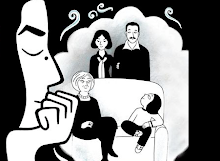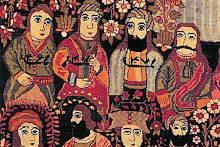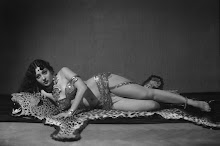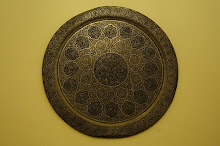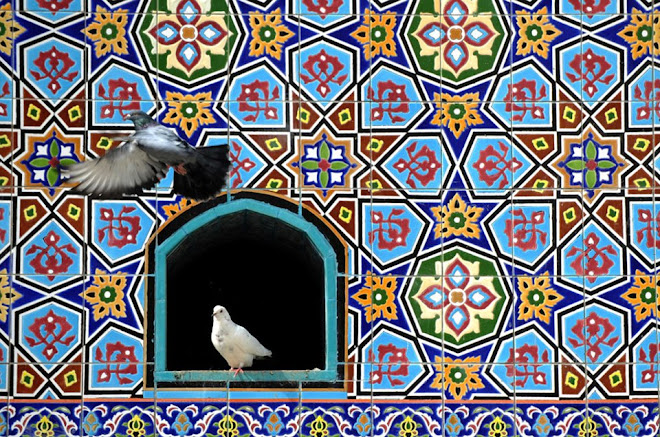This photograph, likely of a rug merchant in in the 1940s, can be found in the Guardian newspaper's article on Chafic Ahmad Soussi, photographer of Saida (Lebanon).
Thursday, August 22, 2013
Tuesday, August 13, 2013
The Sayings of Omar Ibn El Khattab
To eat less is healthy,
to speak less is wisdom, and to sleep less is worship
*
To earn a suspicious living is worse than begging.
*
The person who calls himself learned, indeed he is ignorant, and the one who calls himself from the dwellers of Paradise surely he is from the dwellers of Hell.
The person who calls himself learned, indeed he is ignorant, and the one who calls himself from the dwellers of Paradise surely he is from the dwellers of Hell.
*
There
are three types of people:
- Successful: he who listens to the advice of people and ponders over it.
- Lazy or Lethargic: he who does what he wants without consultation or advice of people.
- Corpse: who neither gives nor listens to advice and consolation.
*
The sound of music and
that of a mourner are two of the worst sounds.
Do not forget about
yourself whilst being concerned for others.
*
Sunday, August 4, 2013
The Lottery in Babylon
In Ancient Babylon, once upon a time, a lottery helped to create reality. It began simply enough when commoners drew rectangular bones with symbols on them to see who would gain a certain prize. Some won, some lost, but, quickly, people began to lose interest in this simple game.
An ingenious citizen suggested the introduction of a few unlucky draws among the "wins", e.g. a certain symbol would result in a monetary fine instead of a reward. Babylonians flocked to this innovation, the tickets sold out, and whoever did not play was considered a lowly coward.
The "Company" that ran the lottery needed to collect the fines in order to pay the winners, and it began to jail those who refused to pay for their unlucky draws. Soon enough, the jail sentence became part of the lottery, i.e. a losing number would land you directly in jail.
This led to a further rise in popularity of the lottery, but also to demands that it become more accessible to the masses. Until then, the elites, with their resources, had a higher chance of enjoying the terror and pleasure of... chance. Demonstrations and riots ensued until the demands of the people were met. The Company took over all public power in Babylon to ensure equity and probity in the lottery.

Soon enough, in an inevitable evolution, the lottery also became part of the magical intitiatory rites of the worship of Baal. Every sixty nights, draws were held that would decide a man's destiny. Depending on his draw, he could become a member of the council of Magi or mutilated and dishonored. This advancement meant that events, from murder to marriage, were the result of the confluence and combination of 30-40 draws. Spies were contracted by the Company, and dossiers kept in secret caverns, to make sure the players did not collude - and that King Chance still reigned.
Some blamed the Company of corruption and favoritism. It responded by an argument that has since become Scripture. The Company explained how errors had indeed been made, but that these had only increased the factor of chance, not lessened it. Importantly, it said, the lottery had permitted the introduction of chance into the order of the universe, a "periodic infusion of chaos into the cosmos". This principle, however, led to the desire not only to decide a man's destiny by chance, but also the circumstances that led to that fate. The lottery, and the Company's activities, had become a tangle of infinite possibility, draws impacting draws in an endless kaleidoscope of change.
The evolution from there was endless. 'Impersonal drawings' began to take place: someone who bought an amphora of Damascene wine could find a viper within it; a scribe would always include a misrepresentation in his transcript that would be compounded with future transcription errors.
In effect, the Company's operations became a silent functioning everywhere in Babylon. Could every drunken man's screams and the murderer's stabs in the ancient city be a result of its secret agency? Its omnipresence grew until some denied its very existence. Others affirmed that the Company's reality or falsehood made no difference: Babylon was nothing but an infinite game of chance anyway.

Today, Babylon is a mound found between the two rivers, the Euphrates and the Tigris, i.e. literally a tell of Mesopotamia.
'Babylon' is a Hellenization of the original Akkadian name "Babili" or "Gate or Gateway of God"
An ingenious citizen suggested the introduction of a few unlucky draws among the "wins", e.g. a certain symbol would result in a monetary fine instead of a reward. Babylonians flocked to this innovation, the tickets sold out, and whoever did not play was considered a lowly coward.
The "Company" that ran the lottery needed to collect the fines in order to pay the winners, and it began to jail those who refused to pay for their unlucky draws. Soon enough, the jail sentence became part of the lottery, i.e. a losing number would land you directly in jail.
This led to a further rise in popularity of the lottery, but also to demands that it become more accessible to the masses. Until then, the elites, with their resources, had a higher chance of enjoying the terror and pleasure of... chance. Demonstrations and riots ensued until the demands of the people were met. The Company took over all public power in Babylon to ensure equity and probity in the lottery.

Soon enough, in an inevitable evolution, the lottery also became part of the magical intitiatory rites of the worship of Baal. Every sixty nights, draws were held that would decide a man's destiny. Depending on his draw, he could become a member of the council of Magi or mutilated and dishonored. This advancement meant that events, from murder to marriage, were the result of the confluence and combination of 30-40 draws. Spies were contracted by the Company, and dossiers kept in secret caverns, to make sure the players did not collude - and that King Chance still reigned.
Some blamed the Company of corruption and favoritism. It responded by an argument that has since become Scripture. The Company explained how errors had indeed been made, but that these had only increased the factor of chance, not lessened it. Importantly, it said, the lottery had permitted the introduction of chance into the order of the universe, a "periodic infusion of chaos into the cosmos". This principle, however, led to the desire not only to decide a man's destiny by chance, but also the circumstances that led to that fate. The lottery, and the Company's activities, had become a tangle of infinite possibility, draws impacting draws in an endless kaleidoscope of change.
The evolution from there was endless. 'Impersonal drawings' began to take place: someone who bought an amphora of Damascene wine could find a viper within it; a scribe would always include a misrepresentation in his transcript that would be compounded with future transcription errors.
In effect, the Company's operations became a silent functioning everywhere in Babylon. Could every drunken man's screams and the murderer's stabs in the ancient city be a result of its secret agency? Its omnipresence grew until some denied its very existence. Others affirmed that the Company's reality or falsehood made no difference: Babylon was nothing but an infinite game of chance anyway.

*
Babylon itself experienced the grand lottery of history rising from small village to city-state by 1874 B.C. Later, it became capital of the Babylonian empire and holy city of Mesopotamia under Hammurabi, the great lawmaker. It met its demise through conquest by the Assyrians, Edomites and others, and, later, renewal under the Chaldeans and the "neo-Babylonian Empire" of the 6th century B.C. This incarnation included the Hanging Gardens of Babylon, one of the Seven Wonders of the Ancient World. Its final decline came under Persian, Macedonian and Roman rule.Today, Babylon is a mound found between the two rivers, the Euphrates and the Tigris, i.e. literally a tell of Mesopotamia.
'Babylon' is a Hellenization of the original Akkadian name "Babili" or "Gate or Gateway of God"
This post is a summary of a story by Jorge Luis Borges (including misrepresentations)
Labels:
Anecdotal Histories,
Commentary,
History,
Iraq
Subscribe to:
Posts (Atom)









